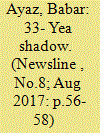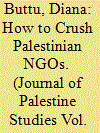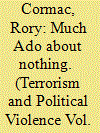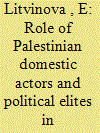| Srl | Item |
| 1 |
ID:
154606


|
|
|
| 2 |
ID:
188237


|
|
|
|
|
| Summary/Abstract |
Israel has long sought to erase Palestinians, Palestinian resistance, and Palestinian organizations. In Israel’s latest rendition of erasure, Palestinian nongovernmental organizations (NGOs) have become the new target. By labeling NGO staff, and now NGOs, as “terror-affiliated,” Israel is attempting to silence these organizations by making it impossible for them to be funded. Looking at the case of Mohammed El Halabi from World Vision, one can see that it does not take much for donors to run scared: just using the “t” word is sufficient, with no need for evidence.
|
|
|
|
|
|
|
|
|
|
|
|
|
|
|
|
| 3 |
ID:
121905


|
|
|
|
|
| Publication |
2013.
|
| Summary/Abstract |
Through its ability to transcend not only national boundaries but so too departmental jurisdictions and the traditional public-private security divide, the rise of international terrorism in the late 1960s and early 1970s posed a number of challenges to the British intelligence machinery which remain relevant today. This article focuses on the dangers and mechanics of threat exaggeration and the importance of intelligence coordination to ensure that threats are assessed and reports are disseminated in a realistic manner. Using the over-emphasised threat of maritime terrorism in 1970 as a case study, this article is able to examine the intelligence cycle as a whole and consider the importance of source validation, the dangers of incremental analysis, and the need for coordinated advice disseminated coherently to consumers both inside and outside of the government.
|
|
|
|
|
|
|
|
|
|
|
|
|
|
|
|
| 4 |
ID:
139731


|
|
|
|
|
| Summary/Abstract |
THE ISSUE OF PALESTINE is unique, and not only because it is part and parcel of the Middle East conflict and attempts to solve it. The study of the experience of the political institutionalization of the Arab Palestinian territories, of the structuring of Palestinian political processes, of the activities and split of the Palestinian National Authority (PNA), and of the record of the international community as the "architect" of modern Palestine makes it possible to evaluate the roles of Palestinian domestic actors and political elites, understand internal and external factors in building new states in the Middle East, and assess the effectiveness of proposed systems of political organization.
|
|
|
|
|
|
|
|
|
|
|
|
|
|
|
|